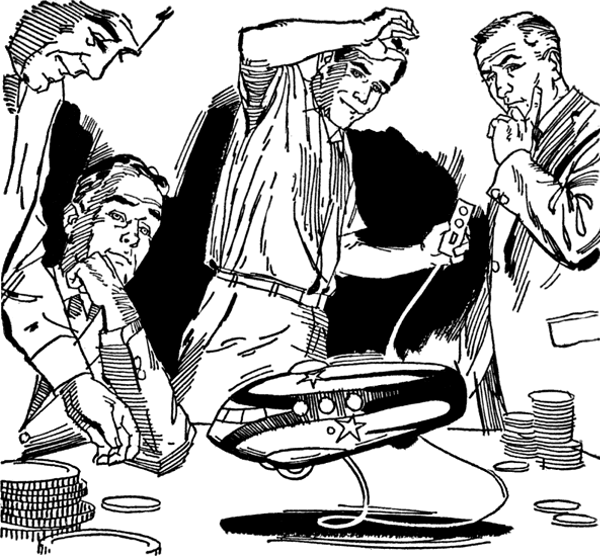
by Gideon Marcus
Ask the average citizen their opinion of science fiction and they'll likely mention monsters, flying saucers, and ray guns. SF has gotten a bad rap lately, largely due to the execrable movies nominally representing it, but there's no question that the pulps of the 30s and 40s, and the lesser magazines of the 50s didn't help much. And yet, only Science fiction offers endless worlds in which to explore fundamental human issues. Religion. Philosophy. Politics. It is only in our fantastic genre that the concept "if this goes on" can be pushed to extremes, whether a story be set in the far future or on a remote planet. SF isn't just kiddie stuff – it can be the most adult of genres.

Case in point: Analog, formerly Astounding Science Fiction, set a standard in the pulp era as the grown-up magazine in the field. And while I've had something of a love-hate relationship with the digest that Campbell built, this particular issue – the April 1962 edition – offers up some intriguing political predictions that, if not probable, are at least noteworthy.
Mercenary, by Mack Reynolds

Take four concepts and carry them to the nth degree: 1) unions and corporations increase in power such that they become virtual nations; 2) world disarmament is achieved – to the point that post-1900 weaponry is abolished; 3) the public's demand for violence on television is insatiable; 4) economic class stratification gets stronger.
The result is a United States where private entities no longer resolve disputes in court; they do literal battle with brigades, even divisions of professional soldiers. Their conflicts are televised as circuses for the masses (whose bread needs have been met by automation). Mercenary is the tale of a veteran-for-hire who is desperately trying to climb the social ranks with the one remaining avenue: a successful military career.
This novella is my favorite of the bunch. Reynolds, who has traveled the world and seen both the Soviet Union and the Mahgreb first-hand, invests his work with a gritty realism that elevates it above its genre siblings. It's what Dickson's Dorsai should have been in about half the space. Four stars.
Toy Shop, by Harry Harrison

When no reputable government agency will look at your breakthrough scientific achievement, then it's time to resort to unorthodox methods, right? I'm disappointed with this one. It's clearly an opportunity for Harrison (normally quite good) to get a quick $100 from editor Campbell, who champions all sorts of quackery. Two stars.
A Slave is a Slave, by H. Beam Piper

Take a colony of humans, reduce them to slavery at the hands of a rapacious space vikings, and let stew for seven centuries. Then topple the viking-descended overlords and see what happens. This story, set in Piper's often presented Galactic Empire, is a clear analogy for decolonization. It's got some straw men, some broad strokes, some glib presentation, but I think it makes some good points. The oppressed aren't always the good guys. The road to democracy is a long and fraught one. Noble intentions do not guarantee positive outcomes. Three stars.
Suppressed Invention, by John W. Campbell, Jr.
I rolled my eyes when I saw the title and the byline for this one, but I was surprised to find that this essay, about recent advancements in electric battery science, is both readable and informative. Sure, it's got a little bit of the Campbellian spin on things, but the basic facts are here and nicely presented. Three stars.
The Circuit Riders, by R. C. FitzPatrick

We've seen the idea of "pre-crime" before, where police attempt to stop incidents before they occur. The example that stands out most to me is Philip K. Dick's Minority Report. FitzPatrick, to all accounts, is a new author, but he's arrived on the scene with a visceral sensitivity in his first story that suggests he'll be offering up great stuff in the future. A detractor from Riders is that, after a fantastic cold open first act, FitzPatrick then devotes an unnecessary scene to explaining the mechanics behind the "deAngelis" thought monitor. Also, the resolution isn't quite up to the build-up. An invention that can monitor emotional patterns needs a book, is worth a book. Three stars.
***
Thus, Analog finishes this month on the right side of decent 3-star quality. Moreover, it presents a set of intriguing visions guaranteed to make you think. And that's exactly what science fiction should do.


To Fitzgerald three tips of the hat (or a tip from three hats, from species more cephalically advantaged.) One for the solid near-future, one for how technology is used effectively and one for sheer good writing.
Though I think The Circuit Riders the issue's best, Mercenary is decidedly one of Reynolds' better. I thought it might trail off at the end. But that final little twist made the ending one of the pluses. It seemed rather Campbellian. For Reynolds, anyway, I think Campbell might be a good editor. (And it has an oddly Laumer taste, too; which I don't object to.)
I did enjoy the Harrison, though I'm not going to put him in charge of any selling I wnt done.
Indeed. Honestly, I vacillated between three and four for Riders. I am not surprised you liked it.
"Mercenary" wasn't bad, although I thought the rule about eliminating all weaponry designed since 1900 was the most implausible concept in the story. Hard to believe anybody would give up and weapon once it exists.
"Toy Shop" was minor and forgettable.
I found "A Slave is a Slave" to be tedious. I took it as an allegory of the Russian Revolution. Otherwise, I wasn't sure what point the author was trying to make.
I have to agree with Stephanie that "The Circuit Riders" was the best story in the issue. Very realistic extrapolation of the speculative content.
I suspect the intent was more like "giving up all weaponry after 1900 for the purposes of corporate combat." It wouldn't necessarily mean they weren't available to other polities for other purposes.
Reynolds' newer work often seems… abbreviated. A main concept and just enough story to present it. Even though he didn't really tell us much of the backstory and goings-on this time, it *felt* like he did, which made the whole thing seem more satisfying, somehow.
I'm a fairly big Piper fan, but I agree with you about "A Slave Is A Slave." I found it both predictable and boring; not usually the case with Piper.
The Campbell essay was far better than his usual, and it contained a lot of interesting information I'm sure I couldn't have obtained from the local library. The battery powered drill looks right out of "Popular Science", though. It might be okay for drilling a few holes in a board, but I just don't see the batteries providing enough energy to do much more than that.
I absolutely love maximizing content in a minimum of space. That kind of skeletal exposition is masterful.
Only four stories. You know how I feel about cramming a small number of long stories into one issue. At least these were all decent.
I didn't expect to like the Reynolds when I started it. I was wrong. I do think Mauser cheated, though. Gliders might predate 1900, but a modern glider has gone through a lot of development since. There's also the little matter of having to use modern technology to get the thing in the air.
The Harrison was an amusing little piece, but did feel somewhat cursory. I see exactly what he was aiming for, but he didn't quite get there. I'm not sure that target is really a Harrison type of story.
The Piper was readable, as Piper always is, but certainly not his best work. Until the end, I thought he was trying to point out that the Masters were as much slaves as the Slaves. Or maybe more like pampered pets, since they seemed to be utterly incapable of actually doing anything. Let's hope the next one is better.
"Circuit Riders" was interesting and a good read. It could have used a little more story, perhaps. Not that there isn't a plot through-line, but it's rather obscured by all the rest. I don't know if there really is a whole book in this idea. A solid three and I did really like the writing style.
I looked at the title of Campbell's piece, rolled my eyes and skipped past it. Based on your comments, I went back and read it. Actually quite interesting. I think he's wrong about the economic viability of these Ni-Cd batteries. Yes, cadmium is hard to find , dreadfully expensive right now and a byproduct of zinc mining. There was a time when aluminum was more costly than platinum. Today, we use it in all sorts of applications. These batteries seem like the sort of thing that will drive exploration, mining and refining techniques, and bring the price down to a commercial level.
Thinking back, the Piper story feels more like a vignette that's intended to be part of a longer work than a standalone story. Maybe we'll see the text incorporated into something else eventually.
I have to wonder if the price of cadmium will plunge such that we'll use Ni-Cd batteries for everything. They seem revolutionary.
Re: Piper, he's written a lot of stories in that universe. My view was informed by that.
It may have helped that I was a captive audience for that story — I walked for about 3.5 miles with the magazine, reading as I trudged!
Well, every other technology has improved in the sixty-odd years since 1900 as well. Modern barrels and ammunition are better than their 1900 equivalents, modern metallurgy, ration preservation… an army takes a lot of *stuff* to get each fighting man to the place and time to to his job, with the tools he needs to do it with.
Heck, even the lowly bow and arrow has improved. The first fiberglass bows came out shortly after the war, and they return more energy (hit harder) than a wooden bow, and are impervious to weather. Modern synthetic string materials don't go slack when they get wet. They still look like ordinary recurve bows, though, and would presumably be allowed in Joe Mauser's world.
On the other hand, a couple of years ago someone patented a bow with eccentric cams and pulleys, with the string wound through it all. The eccentrics change how the bow bends, and how much strength is needed to hold it drawn. If the claims are true, it's like the difference between a caplock rifle and a cartridge rifle; the kind of thing that improves performance so that it's an unbeatable advantage. It's doubtful such a bow would be allowed under those circumstances.